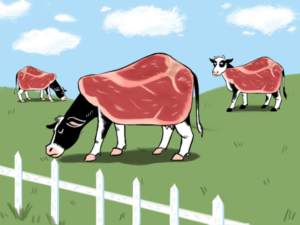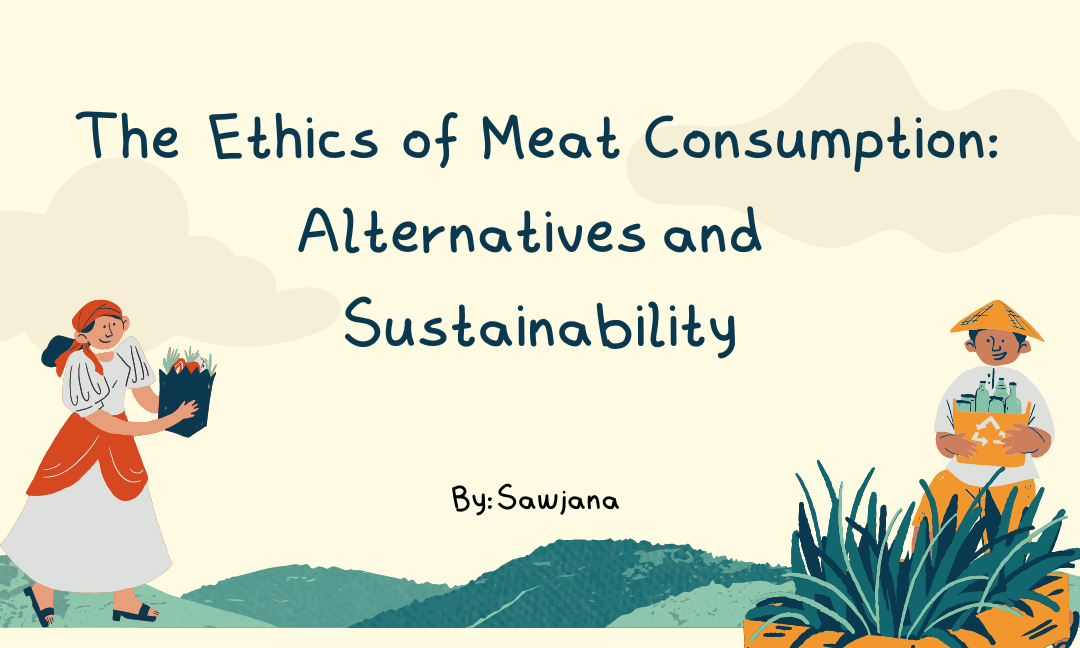Written by: Sawjana
Edited by: Kiritika Rana
Designed by: Kiritika Rana
Published by: Kiritika Rana
In recent years, the ethical considerations surrounding meat consumption have gained significant attention, prompting individuals and societies to reevaluate their dietary choices.  This blog aims to shed light on the ethics of meat consumption, emphasizing alternatives and sustainability from the perspective of a high school student. As I navigate my academic journey, I have encountered various arguments, scientific research, and personal experiences that have shaped my understanding of this complex issue. Join me as we delve into the ethical dimensions of meat consumption and explore the viable alternatives that can lead us toward a more sustainable future.
This blog aims to shed light on the ethics of meat consumption, emphasizing alternatives and sustainability from the perspective of a high school student. As I navigate my academic journey, I have encountered various arguments, scientific research, and personal experiences that have shaped my understanding of this complex issue. Join me as we delve into the ethical dimensions of meat consumption and explore the viable alternatives that can lead us toward a more sustainable future.
- Defining the Ethics of Meat Consumption:
To embark on a thoughtful exploration of meat consumption, we must first define its ethical concerns. This section will delve into animal welfare, environmental impact, and the broader ethical frameworks that shape our perception of meat consumption. By examining the moral implications, we can understand the need for change and the urgency to seek alternatives.
- Examining the Environmental Footprint of Meat Production:
The environmental impact of meat production is a crucial aspect of the ethics debate. Here, we will delve into the staggering statistics surrounding land and water usage, greenhouse gas emissions, and deforestation linked to livestock farming. Drawing on scientific studies, we will explore the correlation between meat consumption and climate change, shedding light on the need for sustainable alternatives.
- Animal Welfare: Ethical Considerations and Alternative Perspectives:
Concerns for animal welfare are a significant driver behind the rise of ethical vegetarianism and veganism. In this section, we will examine the ethical arguments that underline the mistreatment of animals in industrial farming practices. We will also explore alternative perspectives, such as free-range and organic farming, that aim to address these concerns while allowing meat consumption.
- Sustainable Alternatives to Meat Consumption:
As the demand for meat rises, exploring sustainable alternatives becomes paramount. This section will explore options such as plant-based diets, lab-grown meat, and insect-based protein sources. We will delve into these alternatives’ nutritional aspects, environmental benefits, and ethical considerations, highlighting the potential for a more sustainable and compassionate food system.
- The Way Forward: Collective Action for Change:
In the final section, we will discuss the importance of collective action in driving change. We can create a more ethical and environmentally conscious food culture by encouraging open dialogue, promoting education, and supporting sustainable initiatives. I will share practical tips and resources for individuals who wish to align their dietary choices with their ethical beliefs.
The ethics of meat consumption encompass a range of considerations, including animal welfare, environmental impact, and the pursuit of sustainable alternatives. As a high school student, my academic journey has equipped me with knowledge and personal experiences that have shaped my understanding of this complex issue. By exploring the ethical dimensions of meat consumption and examining viable alternatives, we can foster a more sustainable future and promote compassionate food choices. Together, let us embark on this ethical exploration and work towards a better world for all beings.
Work Cited
https://plato.stanford.edu/entries/ethics-meat/
http://www.fao.org/3/a-i3437e.pdf

